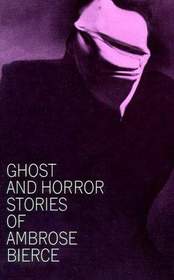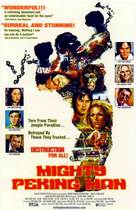Our editor-in-chief Nate Yapp is proud to have contributed to the new book Hidden Horror: A Celebration of 101 Underrated and Overlooked Fright Flicks, edited by Aaron Christensen. Another contributors include Anthony Timpone, B.J. Colangelo, Dave Alexander, Classic-Horror.com's own Robert C. Ring and John W. Bowen. Pick up a copy today from Amazon.com!
Cold Reads: The Damned Thing by Ambrose Bierce
Horror is fear of the unknown, the invisible terror lurking just beyond our sight. Even in movies and literature when the creature or abomination is exposed in all their grotesque glory, it is the thought of them slinking in the darkness that creates the tension. As the cliché goes, what you don't see is more frightening than what you do see. Ambrose Bierce teaches us this most valuable of lessons in his short but powerful tale of "The Damned Thing."
It is night, a collection of men are gathered together in a small cottage. One of them is a coroner who is reading from the diary of the corpse (tastefully placed on the table) by the light of a candle. William Harker soon arrives at the inquest, having been summoned to come due to the fact that he accompanied the deceased, Hugh Morgan, in the last days of his life. Harker has a fantastic tale to tell, one that he can hardly come to grips with. Having been invited by Hugh for a week of hunting, Harker arrives at the cottage and is stunned by his host's strange manners. Things go from bad to worse when, while tracking through a field of wild oats, the men are attacked by an unseen beast whose movements can only be determined from the path of crushed foliage it leaves in its wake. The invisible monster has soon slaughtered Morgan, leaving Harker with a corpse and a mystery. But the last few pages of Morgan's diary just may explain the incalculable implications of the monster's existence...
While it might seem a tried plot by today's jaded standards, the premise of Bierce's story is fresh and original given the time it was written in. The story of the invisible, alien menace has been copied most predominantly in the science fiction genre and one can definitely see the inspiration authors such as Lovecraft might have gleaned from this tale. The cosmic threat that the Damned Thing poses to humanity is chilling, even more so than H. P.'s Great Old Ones. This is simply because the Damned Thing is invisible, undetected by the human eye. If it wasn't for its apparently great size (and thus its noisy approach), mankind would not be able to stand against such a being without being able to give it some shape.
This is where the true terror of Bierce's story lies. He is commenting on the frailty of our senses, a very philosophical view for a campfire tale. Morgan hypothesizes in his diary that there are sounds, colors, and other sensations that are unreachable by human perception on their respective spectrums. Bierce uses the example of birds to illustrate his point. At the end of the story, Morgan comments on how a flock of birds flies from a tree, seemingly for no discernible reason at all. The hunter supposes that the leader of the flock had called out a signal, a note so high that the human ear could not pick it up. Morgan then applies this theory to the mystery of the Damned Thing. What if, he wonders, there are colors, either too light or dark in tone, that are unseen by the human eye. A creature of this chromatic scheme could slip by, completely invisible. This theory is not really far-fetched in the least when you think about it and it makes the Damned Thing all the more horrifying to ponder.
It seems all the more fitting that Bierce refrains from using brave and knowledgeable men of the world, such as adventurers and antiquarians, and utilizes people from the salt of the earth in his tale. Taking place in Bierce's home of the Southern states, the story takes a new approach to horror in showing us how good ol' country boys might handle the threat of an invisible monstrosity. The characters have no previous knowledge of ancient rites or prophecies warning of dangers to come. The coroner and his comrades have the small-town mentality of sticking to their own business and just going through life on a lackadaisical day-to-day routine. They also seem to posses the collective ignorance of the Transylvanian village stereotype. They refuse to give any credence to Harker's story simply on the basis of their disbelief and refusal to change their views. Bierce shows us the small-mindedness of these characters by their disapproval of the existence of an invisible creature. If they can't see it, then it's not there. Their minds are firmly inside the box and they're not budging an inch. It's ignorance like this that may lead to their ultimate doom.
Despite all these cataclysmic conclusions, Bierce punctuates his story with his trademark brand of sharp wit and sarcasm. This is most apparent in the titles of the chapters that divide the story. He entitles his first section "One Does Not Always Eat What is on the Table" and then introduces us to Hugh Morgan, the presently expired woodsman whose carcass now adorns the table of his lodge. Bierce toys with this black humor (again at the expense of Hugh) in the third chapter "A Man though Naked may be in Rags." This pun refers to the rather gruesomely shredded remains of Mr. Morgan as a result of his short-lived battle with the Damned Thing. Bierce seems to be aware that horror and humor can play off each other superbly. And with Bierce's biting, sardonic pen, this chemistry is balanced out perfectly without the reader being removed from the atmosphere by the sudden bursts of comedy.
"The Damned Thing" is the type of tale to read while camping out in the forest. It will have all the listeners moving in closer to the fire, occasionally glancing over their shoulders to ensure that nothing is emerging from the darkness of the forest. Bierce's story is short and mysterious, leaving most of the tale to the reader's imagination. If you hear a sudden noise in the night, be sure to take a look out to see if anything's really there. But be warned: just because you don't see anything...









Thank you for posting this. I
Thank you for posting this. I found it online and read it ... delightful.
I have this on CD, but I
I have this on CD, but I don't know who is reading it. I listen to it frequently. It is an enjoyable story, and one that has clearly influenced the genre, especially in movies like Predator.
While reading it, I was
While reading it, I was thinking the very same thing... It reminded me very much of the movie Predator.
Back in 2010 I created spooky
Take a listen and let me know what you think!